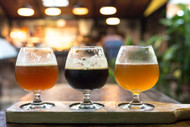What is a local beer ?
Posted by Isabelle Bellet on 15th May 2019
A local beer would be a beer whose ingredients (the 4 main ones being malt, hops, yeast and water) composing the beer come from the terroir, from the place where the brewery that brews the beer is located.
Beer has an ancestral tradition in many countries, including Belgium where many breweries use their own harvests, their own yeast for generations and especially the spring water from their own wells. The Dubuisson family, for example, which has been brewing some recipes unchanged for 80 years, cultivates their own hop fields next to the brewery and only uses water from the brewery's well below the brewery, which contributes to the specific character of Bush beers.
Beers brewed in a specific place will therefore not have the same taste as if they were brewed with the same ingredients, but elsewhere.
Indeed, just like wine with its grape varieties, the same variety of hops that grew in England or the USA will not taste the same! A real influence of weather and soil on the properties of the plant fruit.
Wine lovers have long known that the terroir, or the climatic conditions in which the grapes are grown, have a significant effect on the final taste of the wine. The terroir gives wines produced in different places unique attributes, although the same grape varieties and winemaking processes are used.
Geology also affects the taste and attributes of beer - perhaps even more so than it affects the taste of wine.
The character of a beer depends largely on the character of the water used to make it. This is not really surprising, given that beer contains more than 90% water by volume.
The quality of beer depends on the quality of the water. This ingredient makes it possible to release the flavours contained in malt and hops but also to promote beer fermentation.
Nothing can replace natural spring water, which is highly dependent on local geology for its unique properties, and the character of the natural water used can have a significant impact on the final mixing. In fact, with the availability of malt barley, hops and yeast all over the world, water is often the only local ingredient in beer.
The chemical composition of water is different almost everywhere around the globe. It is influenced by many surrounding factors, such as climate, altitude, soil chemistry, etc.
The composition of the water has a definite effect on the taste of the beer. Water still explains the geographical position of several large breweries today, and its contribution to the history of beer is significant.
Historically, it is water that has given the particular signature to certain styles of beer.
Hard water, which contains high concentrations of calcium, sulphates and bicarbonates, tends to make good, light-coloured hopped beers. Soft water, on the other hand, produces good dark beers.
Over time, industrialization and globalization have taken hold. There was then a mixing of products from different regions and countries. Many brewers nowadays work with American hops, German malt, water from a distant source (or demineralised and remineralised!) and yeasts from yet another source... It is therefore difficult to speak, in this case, of a local beer.
But the majority of Belgian artisanal breweries use local ingredients: the water from their wells, yeasts grown for generations, or wild yeasts in the air (in lambics and gueuzes). And their recipes can not be exported with the same results.

